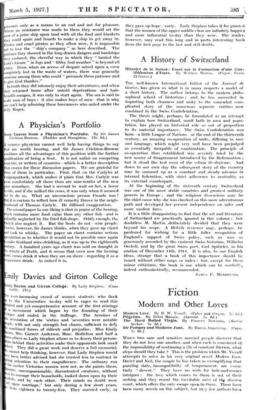A History of Switzerland
Histoire de la Suisse : Essal sur la Formation d'une Con. ted6ration d'Etats. By William Martin. (Payot, Paris:
24 francs.)
THE well-known International Editor of the Journal de Genke, has given us what is in many respects a model of a short history. The author belongs to the modern philo- sophical school of historians ; and he has succeeded in imparting both clearness and unity to the somewhat com- plicated story of the numerous separate entities now combined in the Swiss Confederation.
The thesis might, perhaps, be formulated as an attempt to explain how Switzerland, small both in area and popu- lation, has played an historical role so out of proportion to its material importance. The Swiss Confederation was born—a little League of Nations —at the end of the thirteenth century, an amazing co-operation of units, differing in race and language, which might very. well have been prejudged as essentially incapable of combination. The principle of co-operation thus established was severely tried by the new source of disagreement introduced by the Reformation ; but it stood the test even of the odium thrologieum. And down to our own day the subsequent story of the country may be summed up as a constant and steady advance in internal federation, with strict adherence to neutrality as its external counterpart.
At the beginning of the sixteenth century Switzerland was one of the most stable countries and greatest military powers in Europe ; and the religious dissensions may be the chief cause why she was checked on this more adventurous path and developed her present independence on safer and more modest lines.
It is a little disappointing to find that the art and literature of Switzerland arc practically ignored in this volume ; but doubtless Martin deliberately decided that they were beyond his scope. A British reviewer may, perhaps, be pardoned for wishing for a little fuller recognition of England's support of Swiss policy, such as was so generously accorded by the eminent Swiss historian, Wilhelm Oechsli, and by the great Swiss poet, Carl Spitteler, in his oration of December 14th, 1914. It is also, to our English ideas, strange that a book of this importance should be issued without either maps or index ; but, except for these minor criticisms, the book is one which can be cordiallyi indeed enthusiastically, recommended.
JAMES F. MUIRHEAD.






























































 Previous page
Previous page